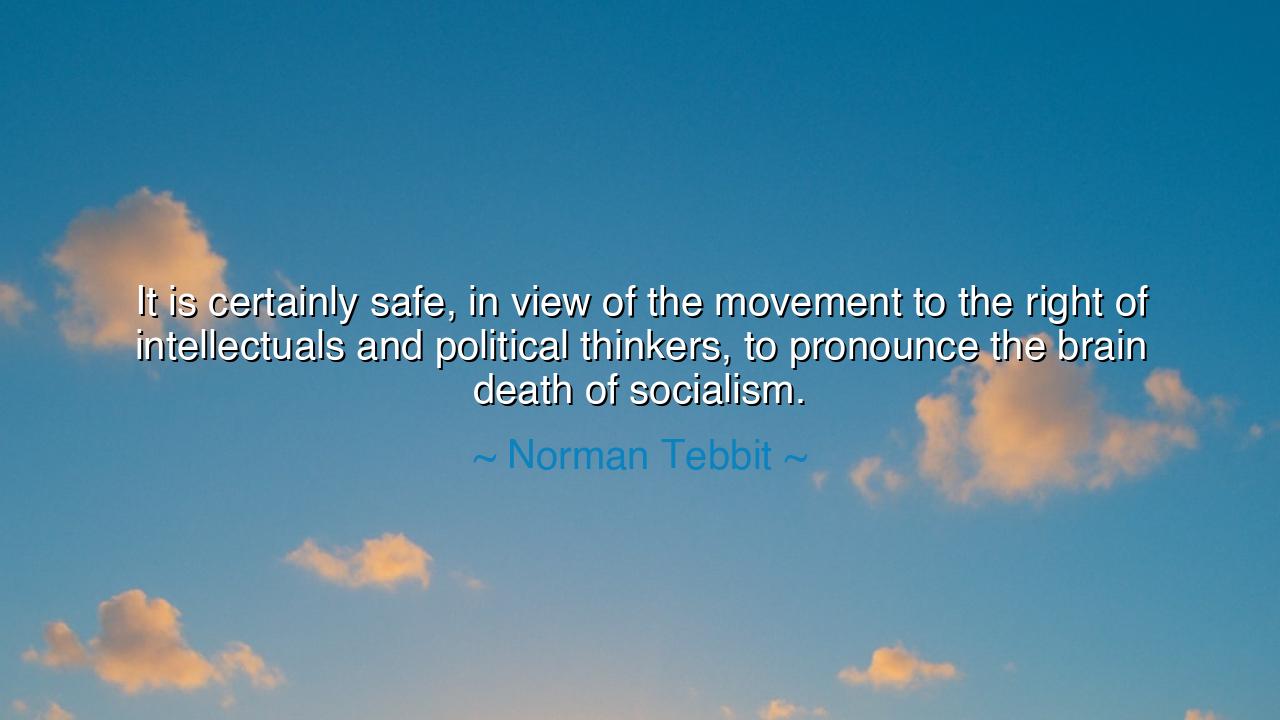
It is certainly safe, in view of the movement to the right of
It is certainly safe, in view of the movement to the right of intellectuals and political thinkers, to pronounce the brain death of socialism.






When Norman Tebbit declared, “It is certainly safe, in view of the movement to the right of intellectuals and political thinkers, to pronounce the brain death of socialism,” he was not simply offering a political judgment — he was announcing what he believed to be the passing of an idea, the fading of a dream that once sought to reorder the world. His words, sharp and deliberate, echoed through the corridors of a changing age — the late twentieth century, when the tide of conservatism swept across nations and the old banners of socialism began to fray. In this sentence, Tebbit, a leading figure in the government of Margaret Thatcher, proclaimed that an entire philosophy had lost its vitality — that it had ceased to think, to evolve, to inspire. What he called the “brain death” of socialism was, in his eyes, the end of its intellectual heartbeat.
To understand the origin of this quote, one must picture the world as it stood in the 1980s. The Cold War raged, but the communist experiment that had promised equality was showing signs of rot. The Soviet Union stagnated under the weight of bureaucracy and repression; economies built upon collective control struggled to feed their people. Meanwhile, in the West, free markets surged, technology expanded, and individuals began to believe more in their own strength than in the state’s protection. In this moment, Tebbit’s words reflected the confidence of victory — a belief that capitalism had triumphed not only in economics but in spirit. To him and his allies, socialism no longer represented progress or justice, but decay — an ideal whose time had passed.
Yet even in his triumph, there lies a deeper lesson about ideas. For no idea, whether born of freedom or equality, lives or dies by decree alone. The philosophies of mankind rise and fall with the hearts of their believers. When Tebbit spoke of “brain death,” he did not mean that socialism had ceased to exist materially — for its institutions still lingered — but that it had ceased to inspire thought. It had become rigid, repetitive, and disconnected from the dreams of a new generation. The intellectuals who once championed it had turned away, seeking fresher answers in the marketplace of ideas. Thus, socialism’s failure was not merely political — it was philosophical, a failure of imagination.
History offers parallels to this pattern. In ancient Rome, the ideals of the Republic — civic virtue, equality before law, duty to the common good — were declared dead long before the Republic itself fell. The people still marched, the Senate still met, but the idea had lost its soul. It was replaced by empire, wealth, and power, until finally the shell collapsed. So too, Tebbit suggested, had socialism become a hollow form — its slogans still repeated, but its spirit departed. Yet the wise must ask: was this death final, or only a deep slumber, awaiting rebirth in another form? For ideas, like seeds, may die in one age only to rise again in another soil.
Consider the collapse of the Soviet Union two decades later — a seeming confirmation of Tebbit’s prophecy. The red flag was lowered, and the markets of Russia opened to the world. Across Eastern Europe, walls fell and new nations were born. It appeared that the contest of ideologies had ended, that capitalism reigned alone. But history, with its eternal rhythm, rarely closes a chapter so easily. In the years that followed, inequalities deepened, greed grew bold, and new generations began to ask once again about fairness, justice, and the dignity of labor. The “brain death” of socialism, perhaps, was not death at all — but a coma, from which new movements, new thinkers, and new dreams might one day awaken.
Thus, the meaning of Tebbit’s words depends upon one’s own philosophy. To the victor, they sound like triumph — a eulogy for an ideology defeated. But to the philosopher, they sound like warning: that any system, however noble in birth, may wither when it loses its connection to the human heart. The same fate awaits capitalism, democracy, or any creed that ceases to serve compassion and truth. Every idea lives only so long as it serves both the mind and the spirit; once it becomes machinery, it begins to die.
So take this lesson, child of thought and action: do not mistake the death of an idea’s form for the death of its essence. What Tebbit called “brain death” may have been, in truth, a transformation — the breaking of an old skin so that something new might be born. Question the world boldly, and do not cling to slogans grown brittle with age. For the movement of minds is the true life of society, and no philosophy — neither of equality nor liberty — can survive without renewal. As long as there are men and women who dream of justice, the spirit of socialism will flicker on, not as a corpse, but as a phoenix — waiting for the fire of conviction to call it forth once more.






AAdministratorAdministrator
Welcome, honored guests. Please leave a comment, we will respond soon